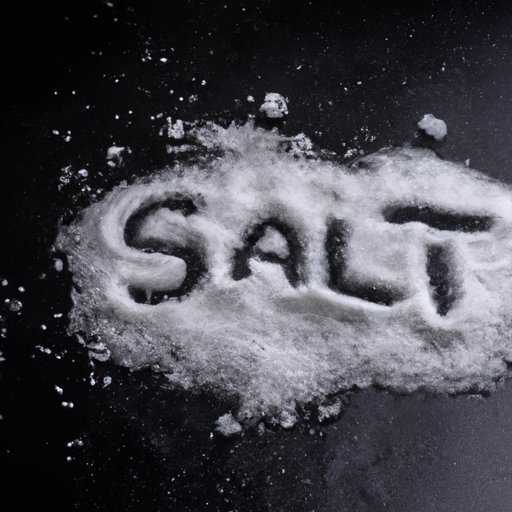
Introduction
Salt is a staple in most kitchens, but it is important to be mindful of the amount we consume on a daily basis. Excessive salt intake can lead to a range of health problems, such as high blood pressure and heart disease. In this article, we will explore how much salt you should really be consuming each day and the impact of sodium on our overall health.
The Basics of Salt: How Much Should You Really Consume Daily?
Before we dive into recommended daily intake, let’s define salt and its functions in the body. Salt is made up of two minerals: sodium and chloride. Sodium plays a key role in maintaining fluid balance, transmitting nerve impulses, and contracting and relaxing muscles. Chloride is important for digestion and maintaining proper pH levels in the body.
According to the American Heart Association, the recommended daily intake of sodium should be no more than 2,300 milligrams (mg) per day for most adults. For those at risk of high blood pressure or heart disease, the recommended intake drops down to 1,500 mg per day. Children and teenagers should also limit their sodium intake to between 1,500 and 2,300 mg per day depending on their age.
Eating Healthy: The Right Amount of Sodium for Your Body
Sodium is the main component of salt, and most of our daily intake comes from processed foods, canned goods, and restaurant meals. Sodium requirements can vary based on a number of factors, including age, weight, and physical activity level. For example, athletes may require more sodium due to excessive sweating and fluid loss during exercise.
In general, it is important to maintain a healthy balance of sodium in the body. Consuming too little sodium can lead to symptoms such as dizziness, muscle cramps, and low blood pressure. On the flip side, consuming too much sodium can lead to negative health outcomes, such as increased risk of heart disease and stroke.
Too much of a good thing? Examining Salt Intake and Its Effects on the Body
Excessive salt intake has been linked to a range of health problems. One of the most notable is high blood pressure, which occurs when the force of blood against the walls of the arteries is consistently too high. High blood pressure can lead to heart disease, stroke, and kidney failure.
In addition to high blood pressure, too much salt in the diet can lead to bloating, dehydration, and increased risk of osteoporosis. Sodium intake can also affect various systems in the body, such as the digestive and circulatory systems.
The Salt Debate: Experts Weigh In on How Much We Really Need
There is a lot of debate surrounding the optimal amount of salt intake. Some experts argue that reducing salt intake can have a dramatic impact on health outcomes, while others argue that the research is inconclusive. However, a growing body of evidence suggests that reducing salt intake can lead to improved health outcomes, such as lower blood pressure and reduced risk of heart disease.
Despite this, many Americans continue to consume much more salt than the recommended daily intake. One study found that the average American consumes roughly 3,400 mg of sodium per day, well above the recommended maximum of 2,300 mg.
Finding a Balance: Guidelines for Optimal Salt Consumption
Reducing salt intake may seem daunting, especially for those who enjoy savory foods. However, there are a number of ways to reduce salt intake while still maintaining flavor. Some tips include:
- Use fresh herbs and spices to add flavor to meals instead of salt.
- Choose lower-sodium versions of canned goods and processed foods.
- Avoid adding salt to foods at the table.
- Try salt substitutes, such as potassium chloride, which can provide a similar taste without the negative health effects of sodium.
The Salty Truth: The Impact of Sodium on Our Overall Health
Reducing salt intake can have a range of positive impacts on overall health. For example, lowering sodium intake can help reduce blood pressure and protect against heart disease. In addition, reducing salt intake can also protect against other health problems, such as kidney stones, osteoporosis, and stomach cancer.
Breaking it Down: Understanding Sodium Intake and How to Stay Within Recommended Limits
One of the most effective ways to reduce salt intake is to pay attention to food labels. Sodium is listed on most food labels, and it is important to look for products with lower sodium content. When dining out, it can be helpful to ask for nutritional information or choose dishes with fresh ingredients and simple preparation methods.
It is also important to be mindful of how sodium is used in cooking. Reducing the amount of salt used in recipes can help lower overall intake. Experimenting with different spices and herbs can also help add flavor to meals without relying on salt.
Conclusion
Overall, it is important to be mindful of salt intake and strive for balance in our diets. Consuming too much sodium can lead to a range of health problems, but reducing intake can have a positive impact on overall health. By paying attention to food labels and experimenting with different flavorings, it is possible to reduce salt intake while still enjoying delicious and satisfying meals.





